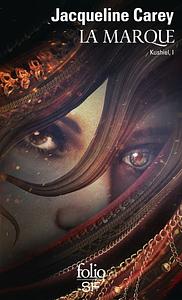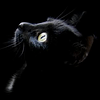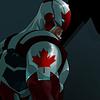You need to sign in or sign up before continuing.
Take a photo of a barcode or cover
adventurous
challenging
emotional
mysterious
sad
tense
slow-paced
Plot or Character Driven:
A mix
Strong character development:
Complicated
Loveable characters:
Yes
Diverse cast of characters:
Complicated
Flaws of characters a main focus:
Yes
adventurous
dark
emotional
mysterious
tense
slow-paced
2.5 stars
What a slog... =\
I would have given the first third of the book alone a 4-star rating. It took me a bit to get into the rhythm of her narration; I had to reread sections multiple times to parse what was being said. Once I fell into it, the beginning of the book drew me in. I tore through that first part.
Then major-plot-point happened (Phédre is sent away), and suddenly I lost the desire to continue reading. I can't pinpoint what exactly it was. I got tired of her describing all not of Terre d'Ange as barbarians. Then there was the dissonance of her being furious at becoming a bed slave, because before she never had to serve anyone she didn't want... except later on she sweetly thinks of someone as the first she chose for herself. Now I don't recall her refusing anyone that Delaunay chose for her, though she was convinced she could have – and by Elua did she want Melisande – and she certainly seemed to enjoy those assignations; but if she could recognize that she hadn't been picking her lovers up to that point, how was this the point where it went too far? It's all fun and games until you end up with someone who isn't angel-spawn?
And for the entire book, I kept reading "Melisande" as "Melisandre", which to be honest kind of works. Still grated on me though.
Joscelin was such an annoying bundle of clichés.
I think the fact that her style of speaking made her sound much older made it easier to forget that she was recounting her sexual experiences starting at 14. It's interesting to think about what a much more sexually open society might think about age-of-consent.
I thought the alternate religious history was pretty neat.
What a slog... =\
I would have given the first third of the book alone a 4-star rating. It took me a bit to get into the rhythm of her narration; I had to reread sections multiple times to parse what was being said. Once I fell into it, the beginning of the book drew me in. I tore through that first part.
Then major-plot-point happened (Phédre is sent away), and suddenly I lost the desire to continue reading. I can't pinpoint what exactly it was. I got tired of her describing all not of Terre d'Ange as barbarians. Then there was the dissonance of her being furious at becoming a bed slave, because before she never had to serve anyone she didn't want... except later on she sweetly thinks of someone as the first she chose for herself. Now I don't recall her refusing anyone that Delaunay chose for her, though she was convinced she could have – and by Elua did she want Melisande – and she certainly seemed to enjoy those assignations; but if she could recognize that she hadn't been picking her lovers up to that point, how was this the point where it went too far? It's all fun and games until you end up with someone who isn't angel-spawn?
And for the entire book, I kept reading "Melisande" as "Melisandre", which to be honest kind of works. Still grated on me though.
Joscelin was such an annoying bundle of clichés.
I think the fact that her style of speaking made her sound much older made it easier to forget that she was recounting her sexual experiences starting at 14. It's interesting to think about what a much more sexually open society might think about age-of-consent.
I thought the alternate religious history was pretty neat.
I'll give this one a four stars. I saw this book for the first time several years ago in the Front Range Community College Library. I was intrigued, but never picked it up. Until, that is, I found it at a library book sale last year. At such a low cost, I felt vindicated in pursuing my curiosity. Unfortunately, as with most books political, I was less than drawn in. I don't mind politics as a backdrop for the plot, but have trouble reading it as the main plot. This was sadly no exception. I enjoyed it well enough, the relationships between characters being enough excuse for me to continue, and Phedre's intelligence being a strong attribute that kept her alive greatly led to me appreciating her character. However, I don't believe the political sequel hook was enough for me to seek out the next book, or the one after. I may one day pick the series back up, but for the moment, my visit to Terre d'Ange is over.
This is the s second time I've read this. I think I liked it more the first time. It's very provocative and engrossing. Carey lays the foundation for a complicated plot very well. Definitely suggest it for a fun, steamy read to take you out if this reality for a little while.
adventurous
dark
slow-paced
Plot or Character Driven:
A mix
Strong character development:
Yes
Loveable characters:
Yes
Diverse cast of characters:
Yes
Flaws of characters a main focus:
Yes
I have a lot of complaints about this book. There's a laundry list of things I didn't like.
But it was still good. My complaints are about the storytelling and the setting and some plot points, but overall, this was a very solid work of fiction and an enjoyable read. Joscelin was an excellent, deep character and had a very dynamic arc through the story. His scenes carried this book, and without him I wouldn't have liked it nearly as much.
Setting - I hate that this book tries to be alternate Europe. Either be Fantasy or be History. This weird mix is gross and continually takes me out of the story rather than letting me get wrapped up in it. There is a series of divine beings made up for this setting, but there are also Yeshuites who have an identical culture to real-world Judaism. There's a magical dude cursed to live out his days causing a visage of his face made of water to terrorize sailors, and you have to cross his domain to get to Scotland. Or, well, whatever the author called Scotland in this story. There's no reason for this.
The other thing that's really killing me about this setting is all of the French names for people, places, and titles in the main area the book is set in. To my non-French-reading eyes, they are largely indistinguishable, even moreso than other books that have giant casts of characters, and I had to consult the directory at the front of the book repeatedly, every time some characters were mentioned in some cases, to even understand who they are. I had to learn some words from context that I presume have meaning in French, mostly around titles that people could have. It took until the second to last chapter in the book before I understood that people didn't have last names so much as estates that had names that they used to identify themselves. The royal family seemed to have three or four different family names before that and I just accepted it without understanding it for a majority of the book. This might sound like a minor complaint, but it's a really bad thing to have a naming convention so confusing to speakers of the language the book is written in that they have to pause reading to consult outside resources.
Characters - Phèdre is flawless. I don't mean that she was written in a way that makes her the ideal fictional character; I mean that she can do no wrong in-world, that she always succeeds at everything she tries to do without difficulty. It's boring, because as soon as you hear her plans it removes a lot of the tension, since you know her plan's going to work. She speaks every language, solves every riddle, and wins over everyone she speaks to so they do her bidding. She is, simply, boring.
Joscelin, on the other hand, is fascinating, for most of the book. When he's struggling between his own survival, adhering to his vow to protect Phèdre, and breaking his other vows to his god, these are great character moments. Later in the book, once he's made his choice, he's less interesting again because the reader knows how things will play out already. The tension of the choice is gone, the development is done, and he becomes stagnant again for the last bit of the book.
Plot - The plot is cyclical, in a way. A person is able to help Phèdre but doesn't want to. Phèdre pleads with him to help her, but he refuses. Phèdre offers to have sex with him. He accepts and then helps her. It's so easy! In reality, this process got tiresome well before it stopped happening. Luckily, it was subverted once late in the story where I was fully expecting Phèdre to offer sex to someone and she wound up coming up with a different solution instead. It was the biggest twist in the entire novel.
Writing - This book is egregiously overwritten. Everything that happens to Phèdre is some superlative, one of the tenderest or most memorable or most poignant or most humbling moments of her entire life. One after another, constantly, from start to finish, she's having epiphany after epiphany about the beauty of life around her. It's tiresome. Let the reader draw the conclusion about the impact of a moment from the context of the moment. Also, using "somewhat" to mean "something" throughout the entire book is a questionable choice.
So, I didn't love this book. I won't be adding its sequel to my to-read list right away, but I will probably come back to this setting to see how things shape up from here. Looking past all of these complaints, there was still a good book here, still a good story, and I'm still interested to see how things play out. I'm just not going to binge it.
But it was still good. My complaints are about the storytelling and the setting and some plot points, but overall, this was a very solid work of fiction and an enjoyable read. Joscelin was an excellent, deep character and had a very dynamic arc through the story. His scenes carried this book, and without him I wouldn't have liked it nearly as much.
Setting - I hate that this book tries to be alternate Europe. Either be Fantasy or be History. This weird mix is gross and continually takes me out of the story rather than letting me get wrapped up in it. There is a series of divine beings made up for this setting, but there are also Yeshuites who have an identical culture to real-world Judaism. There's a magical dude cursed to live out his days causing a visage of his face made of water to terrorize sailors, and you have to cross his domain to get to Scotland. Or, well, whatever the author called Scotland in this story. There's no reason for this.
The other thing that's really killing me about this setting is all of the French names for people, places, and titles in the main area the book is set in. To my non-French-reading eyes, they are largely indistinguishable, even moreso than other books that have giant casts of characters, and I had to consult the directory at the front of the book repeatedly, every time some characters were mentioned in some cases, to even understand who they are. I had to learn some words from context that I presume have meaning in French, mostly around titles that people could have. It took until the second to last chapter in the book before I understood that people didn't have last names so much as estates that had names that they used to identify themselves. The royal family seemed to have three or four different family names before that and I just accepted it without understanding it for a majority of the book. This might sound like a minor complaint, but it's a really bad thing to have a naming convention so confusing to speakers of the language the book is written in that they have to pause reading to consult outside resources.
Characters - Phèdre is flawless. I don't mean that she was written in a way that makes her the ideal fictional character; I mean that she can do no wrong in-world, that she always succeeds at everything she tries to do without difficulty. It's boring, because as soon as you hear her plans it removes a lot of the tension, since you know her plan's going to work. She speaks every language, solves every riddle, and wins over everyone she speaks to so they do her bidding. She is, simply, boring.
Joscelin, on the other hand, is fascinating, for most of the book. When he's struggling between his own survival, adhering to his vow to protect Phèdre, and breaking his other vows to his god, these are great character moments. Later in the book, once he's made his choice, he's less interesting again because the reader knows how things will play out already. The tension of the choice is gone, the development is done, and he becomes stagnant again for the last bit of the book.
Plot - The plot is cyclical, in a way. A person is able to help Phèdre but doesn't want to. Phèdre pleads with him to help her, but he refuses. Phèdre offers to have sex with him. He accepts and then helps her. It's so easy! In reality, this process got tiresome well before it stopped happening. Luckily, it was subverted once late in the story where I was fully expecting Phèdre to offer sex to someone and she wound up coming up with a different solution instead. It was the biggest twist in the entire novel.
Writing - This book is egregiously overwritten. Everything that happens to Phèdre is some superlative, one of the tenderest or most memorable or most poignant or most humbling moments of her entire life. One after another, constantly, from start to finish, she's having epiphany after epiphany about the beauty of life around her. It's tiresome. Let the reader draw the conclusion about the impact of a moment from the context of the moment. Also, using "somewhat" to mean "something" throughout the entire book is a questionable choice.
So, I didn't love this book. I won't be adding its sequel to my to-read list right away, but I will probably come back to this setting to see how things shape up from here. Looking past all of these complaints, there was still a good book here, still a good story, and I'm still interested to see how things play out. I'm just not going to binge it.
I will give this book it's due. Considering I had no clue what the plot was. NOT ONE CLUE, I read it to the end. Who is he again? What's he to her? Who is she again? They don't like each other because of what again? Seriously who are these guys? What's the reasoning behind that decision?
The political machinations of the book were completely lost on me. I thought Game of thrones was hard work but at least things were slowly introduced in book 1. This was like having some one scream a ridiculously complicated plot at you whilst simultaneously making you watch snippets of soft porn.
Having said that this book is lots of fun and I grasped just enough to get through it. Although I'd lost interest by page 700. With 300 pages to go, that was fairly sigh worthy.
It's a very silly book full of shivering and trembling. I wouldn't want to read any more of them.
The political machinations of the book were completely lost on me. I thought Game of thrones was hard work but at least things were slowly introduced in book 1. This was like having some one scream a ridiculously complicated plot at you whilst simultaneously making you watch snippets of soft porn.
Having said that this book is lots of fun and I grasped just enough to get through it. Although I'd lost interest by page 700. With 300 pages to go, that was fairly sigh worthy.
It's a very silly book full of shivering and trembling. I wouldn't want to read any more of them.
Well written tale of politics and intrigue that ties in the beauty of those that find their trade in the pleasure of others. The elaborate religious and caste systems help make the tale come more alive.
So deep and layered, and so very many characters with complicated names. Usually doesn't make for a pleasant reading experience for me, but I made myself not get frustrated, pronounced the names the way that sounded right in my head ("Eula" instead of "Elua," "Shirazi" instead of...Melisande's last name ;), etc.) and just went with it because I loved the writing style. It was so evocative of another time and another reality. I thought it was really beautiful. Also completely loved the characters, all of them, actually, even the 'bad' guys. Phedre is intriguing and I love her relationship with Josscelin. I'll definitely be reading the next in the series.




